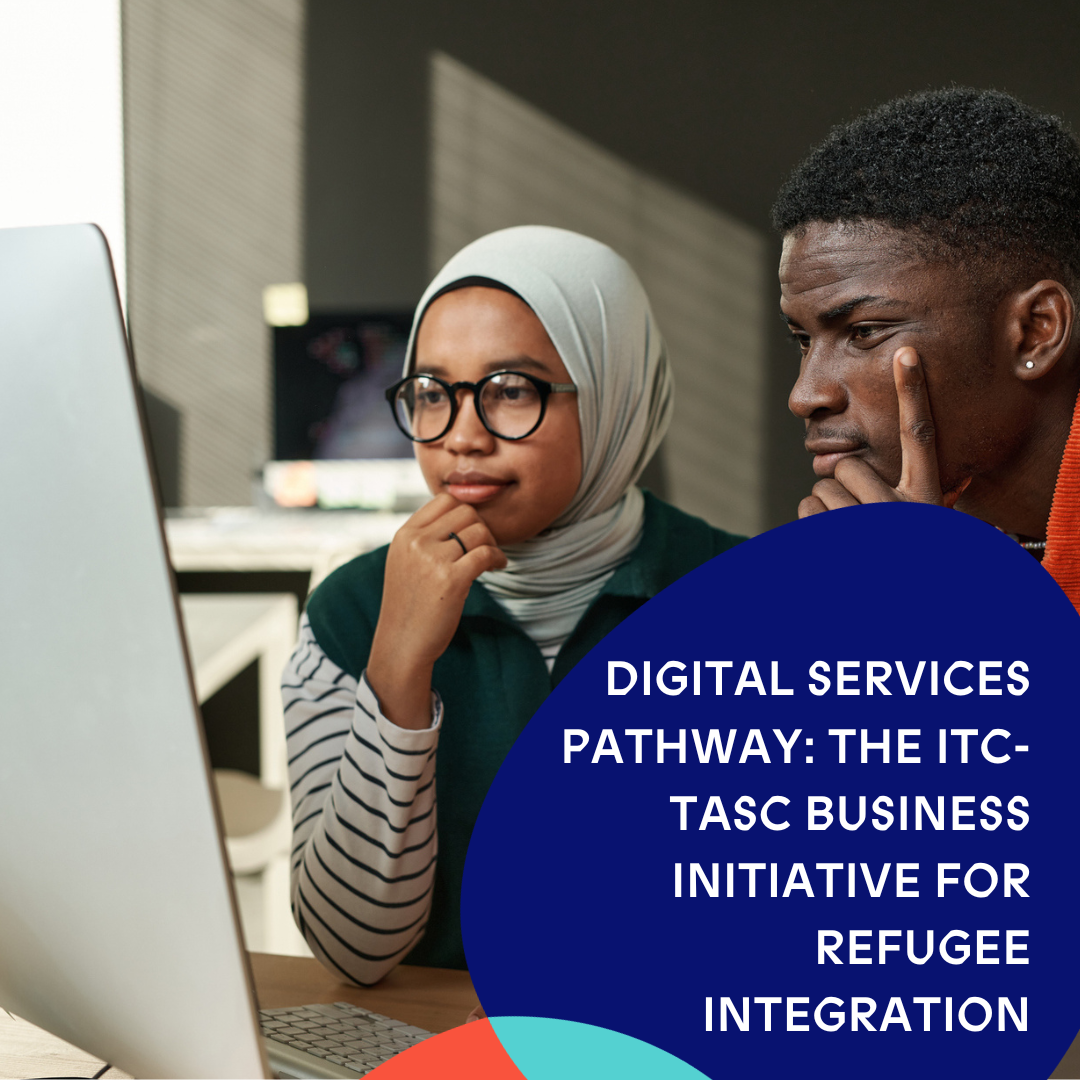Refugees and The Digital Economy
The Refugees and the Digital Economy programme explores how digital work can unlock opportunity, agency, and mobility for displaced talent, while supporting organizations and businesses to adapt to uncertainty in the world of work.
Structured in two phases, the programme first explored telework for refugee livelihoods (April–December 2023). It engaged Ukrainian refugees in Switzerland, together with representatives across four sectors: the Swiss government, NGOs, the private sector, and international organizations. A series of interviews and workshops led to eight actionable policy recommendations.
The second phase (October 2024–December 2024) engaged 16 private sector organizations to assess the viability and scalability of refugee talent integration in the digital economy, resulting in a clearer understanding of the emerging private sector ecosystem supporting digital work for refugees, and how their collective efforts can be strengthened.
The first phase of this project was a collaboration between the Centre for Trade and Economic Integration, the TASC Platform, and the Geneva Trade Platform. The second phase is a joint project of the TASC Platform and the International Trade Centre, supported by the Visa Foundation.
publicationS & Blogs
This paper draws on Refugee Talent Integration in the Digital Economy, a collaborative research project exploring how digital employment initiatives can scale refugee inclusion through cross-sector collaboration. Insights were gathered from 16 private sector organizations and affiliates through interviews and peer discussions between October and December 2024. Together, these contributions surface key areas for strategic and collaborative action, from upskilling models and sourcing strategies to physical and digital employment pathways.
Refugee Talent in The Digital Economy: A Private Sector Conversation
Unlocking Telework for refugees
This joint applied research project charts 8 actionable policy recommendations and pathways for government, NGOs, the private sector, and international organizations to expand digital employment for refugees. Grounded in the lived experience of 15 Ukrainian refugees in Geneva, Switzerland and beyond, and co-developed with 25 organizations, it explores the viability, challenges, and potential of remote work. Through interviews and cross-sector engagement, the research uncovered significant interest and untapped potential for unlocking telework for refugees.
Events & highlights
-
As part of the Pathways to Work programme at the Future of Work Summit 2023, this breakout session convened government representatives, NGOs, private sector leaders, and international organisations actors to examine the potential of telework for refugees. Grounded in the Ukrainian displacement context, the discussion surfaced key barriers and promising directions, contributing directly to the Unlocking Telework for Refugees research project and its effort to shape inclusive, sustainable digital employment pathways.
-
Held virtually on 07 November 2024, this peer discussion, co-hosted by the TASC Platform and the International Trade Centre (ITC), brought together private sector actors working to integrate refugee talent into the digital labour market. Participants exchanged experiences, explored practical strategies, and assessed interest in forming a dedicated community of practice, laying the groundwork for sustained collaboration and shared learning to advance inclusive employment pathways for displaced professionals.
-
Held on 25 November 2024, alongside the UN Forum on Business and Human Rights, this hybrid mastermind built on insights from the last peer exchange and reconvened private sector actors advancing refugee talent integration in the digital economy. This session deepened cross-sector connections and surfaced new strategies to strengthen inclusive hiring practices, through collaborative dialogue and emerging research on digital livelihoods for refugees and displaced populations.
-
Co-hosted with the International Trade Centre during Geneva Trade Week 2023, this second workshop advanced the Unlocking Telework for Refugees research project by presenting findings and testing policy recommendations to expand refugee access to digital employment. Building on the Future of Work Summit 2023 breakout session, it deepened the inquiry by situating telework within trade systems, exploring its potential as a practical, scalable pathway to refugee inclusion in the digital economy.








Funders & Partners
The first phase of this research project and its initial workshops were made possible by the generous support of Mr. Sergei Popov, and carried out in collaboration with the Centre for Trade and Economic Integration (CTEI), the TASC Platform, and the Geneva Trade Platform. The second phase was carried out by the TASC Platform in collaboration with the International Trade Centre (ITC), with generous support provided by the Visa Foundation through ITC.
ABOUT THE CENTRE FOR TRADE AND ECONOMIC INTEGRATION (CTEI)
The Centre for Trade and Economic Integration (CTEI) is the Geneva Graduate Institute's Centre of Excellence for research on international trade. We bring together experts in economics, law, and political science to explore trade, economic integration, and globalization.
CTEI acts as a global hub connecting academics, businesses, NGOs, and policymakers. We bridge theory and practice, including partnerships with research centres in the Global South. Our activities include research projects, high-level events, and a vibrant visiting scholars programme.
The geneva trade platform (GTP)
The Geneva Trade Platform is a not-for-profit organization based within the Geneva Graduate Institute's Centre for Trade and Economic Integration.
We are a hub, designed to bring people, ideas, and resources together to address global challenges through better informed, better supported, and more inclusive trade policy. We rely on the support of donors and delivery partners to deliver need-sdriven, outcomes-focused projects through our four pillars and across our themes.
The INTERNATIONAL TRADE CENTRE (ITC)
The International Trade Centre (ITC) is a joint agency of the UN and the WTO that advances the trade and development agenda, including through the sustainable and inclusive growth of micro, small, and medium-sized enterprises.
ITC’s Refugees and Trade Programme works with public and private sector actors to facilitate better participation in trade for refugee entrepreneurs and refugee-led businesses, including in the digital service sector. The programme is active in key refugee-hosting countries, including Kenya, Rwanda, Uganda, Ukraine, and Pakistan.














